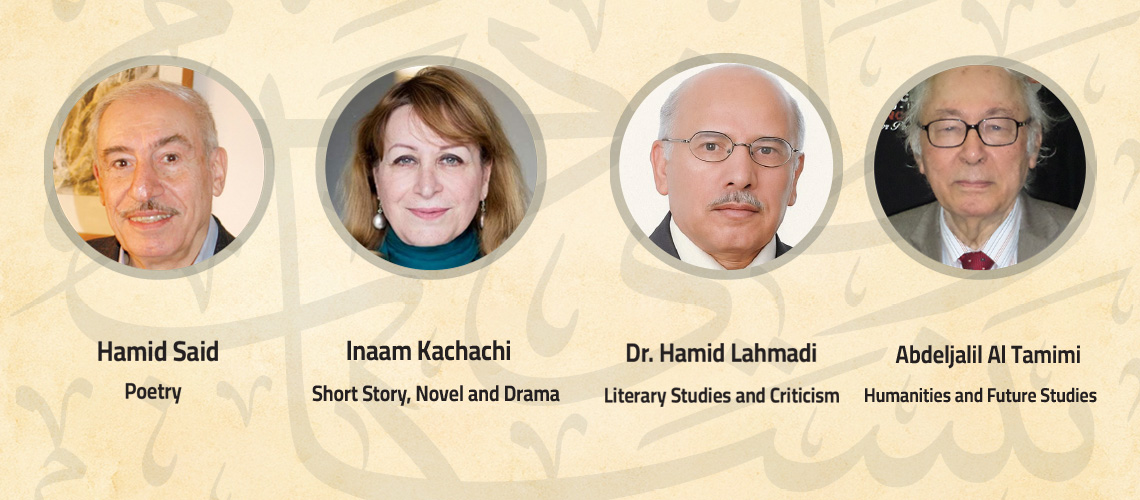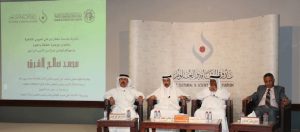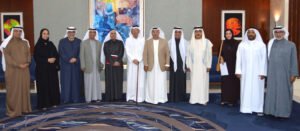The Sultan Bin Ali Al Owais Cultural Award has announced the winners of its 19th edition, recognising the exceptional contributions of four distinguished Arab writers and thinkers in their respective fields.
The winners include Iraqi poet Hamid Said who claimed the Poetry Award, while Iraqi novelist Inaam Kachachi was awarded the Short Story, Novel and Drama Award. The Literary Studies and Criticism award was awarded to Moroccan critic Hamid Lahmadi, while Tunisian thinker Abdeljalil Al Tamimi was honoured with the Humanities and Future Studies Award.
Abdul Hamid Ahmad, Secretary-General of the Sultan Bin Ali Al Owais Cultural Foundation, said that the award’s judging committee selected this group of distinguished Arab writers and thinkers in recognition of their outstanding contributions to their respective fields and for their works that have enriched literature and culture across the Arab world.
The Secretary-General stated: “After extensive deliberations among the the 19th edition’s jury members, it was decided to award the Poetry Award to poet Hamid Said for the coherence of his poetic journey and his deep engagement with both Arab and global cultural heritage. His work reflects a profound awareness of the evolution of Arabic poetry, capturing its interconnected artistic and historical dimensions.”
He added that Hamid Said’s poetry draws its substance and aesthetic from a life marked by both pain and hope, coupled with a deep understanding of the challenges of the era—culminating in a poignant and evocative body of work that echoes the nation’s aspirations for a more beautiful and just future.
The jury awarded the Short Story, Novel and Drama Prize to Iraqi novelist Inaam Kachachi in recognition of her distinguished literary work, which skillfully weaves together documentary and narrative elements. Her writing explores complex themes such as identity, exile, alienation, psychological fragmentation, and nostalgia—offering a rediscovery of the past through a fresh, critical lens. These themes are embodied in characters who have lived on the margins of history, whose stories have often gone untold. Among them are women placed at the centre of life, depicted in her novels with all their strength and vulnerability, successes and setbacks, as they navigate the contradictions and challenges of their realities.
In the field of the Literary Studies and Criticism, the jury awarded the prize to critic Hamid Lahmadi in recognition of his body of work distinguished by methodological originality, extensive knowledge, and a sustained critical project. His contributions, which began in the 1970s and continue to this day, have played a vital role in fostering cultural and intellectual exchange between Arab and Western literary criticism. Lahmadi’s critical approach engages thoughtfully with Western theoretical frameworks, reinterpreting them within a fresh cognitive context. His work is marked by a deep analysis of critical methodologies, as well as practical application through applied criticism, presentation, and evaluation.
The jury also conferred the Humanities and Future Studies Award to researcher Abdeljalil Al Tamimi, a prominent contemporary Arab historian, whose scholarly contributions reflect the evolution of historical research within the framework of modern intellectual thought. Al Tamimi’s work is notable for its breadth and depth, with a particular focus on the history of the Moriscos in Andalusia, the Arab provinces under the Ottoman Empire’s rule and modern Tunisian history. His writings stand as a model of historical documentation, grounded in novel rules of historical writing.
Secretary-General Abdul Hamid Ahmad congratulated the winners of the award, wishing them continued creativity and meaningful contributions to Arab culture. He stated: “The award’s jury has chosen to honour this distinguished group of Arab writers and intellectuals in recognition of their excellence in their respective fields and for their significant contributions to the development of literature and culture in the Arab world.”
In conclusion, he noted that the Scientific and Cultural Achievement Award would be announced later by the Award’s Board of Trustees, citing that this special award, differing from the others, is not subject to standard judging criteria.
The award received a total of 1,940 entries across all field, including 258 candidates for the Poetry Award, 566 for Short Story, Novel, and Drama category, 318 in Literary and Critical Studies, 505 in Humanities and Future Studies, and 293 for Cultural and Scientific Achievement. Since its inception, the award has honoured 105 recipients, with more than 290 judges and consultants from diverse cultural backgrounds participating in the evaluation across all categories.




